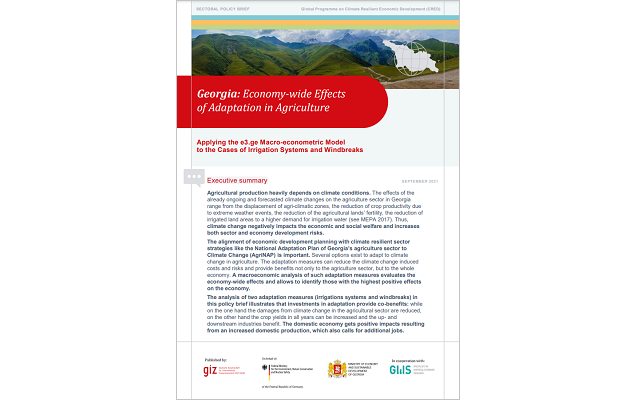Georgia: Economy-wide Effects of Adaptation in Agriculture.
Flaute, M., Banning, M. & Lutz, C. (2021): Georgia: Economy-wide Effects of Adaptation in Agriculture. Applying the e3.ge Macro-econometric Model to the Cases of Irrigation Systems and Windbreaks. Sectoral Policy Brief, Eschborn.Abstract
Agricultural production heavily depends on climate conditions. The effects of the already ongoing and forecasted climate changes on the agriculture sector in Georgia range from the displacement of agri-climatic zones, the reduction of crop productivity due to extreme weather events, the reduction of the agricultural lands’ fertility, the reduction of irrigated land areas to a higher demand for irrigation water (see MEPA 2017). Thus, climate change negatively impacts the economic and social welfare and increases both sector and economy development risks. The alignment of economic development planning with climate resilient sector strategies like the National Adaptation Plan of Georgia’s agriculture sector to Climate Change (AgriNAP) is important. Several options exist to adapt to climate change in agriculture. The adaptation measures can reduce the climate change induced costs and risks and provide benefits not only to the agriculture sector, but to the whole economy. A macroeconomic analysis of such adaptation measures evaluates the economy-wide effects and allows to identify those with the highest positive effects on the economy. The analysis of two adaptation measures (irrigations systems and windbreaks) in this policy brief illustrates that investments in adaptation provide co-benefits: while on the one hand the damages from climate change in the agricultural sector are reduced, on the other hand the crop yields in all years can be increased and the up- and downstream industries benefit. The domestic economy gets positive impacts resulting from an increased domestic production, which also calls for additional jobs.

